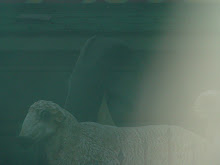i had a guest in the class and after discussing definitions of terrorism and the war on terror, we discussed our experience of 9/11. i was sitting in a high school classroom, a senior, waiting to take a bus to work on cars all morning. after my guest told her experience we watched a clip of reactions to the attacks- no scenes of the flying planes, only the faces on the street looking up in teary eyed disbelief. i talked about how everyone knew someone who knew someone who died that day. the trauma was local. and i talked about the saturation of the image. the fact that the act--the plane crashing--was repeated while the country had it's eye on the building--that we watched as two towers crumbled--that this defined terrorism for us because it was so perfectly effective and run on a loop for weeks. the scenario for trauma could not have been greater.
i looked out at my class and saw students with tears in their eyes. i haven't felt emotional about the event since shock and awe, and it dawned on me that the vulgarity of that war, of our military response, the hubris of the Bush admin, the manipulation, has forever erased the feeling of tragedy and trauma i felt that day.
if i had played the events in reverse chronology, like i do when thinking of them normally, the disgust i feel for torture, ongoing secret prison camps abroad, and the self-righteous notion that we can bend history and culture with military force overshadows any of the pain i could feel about 9/11. looking both ways today makes me question how human beings can live through pain and trauma only to multiply it in the following months, even on people who felt sympathy for the attacks and mourned with the United States (as Afghanistan did).
as we moved on the students wiped their eyes and focused on the war, the deceit, the tactics that no one can honestly defend, and they quickly forgot about the faces on the New York street- the tack boards full of missing people signs, the businessmen covered in soot, the firemen looking up astonished. new scenes of tragedy- starving Iraqi children, babies dead on the side of a Bagdhad street, and brain-washed GIs plugging into "let the bodies hit the floor" replace what came before, anti-Americanism peaks, empathy and sadness replaced by hatred.
and i tried my best to explain: a traumatic event like none other witnessed in the U.S.- a vice president paranoid, carrying around a bio-medical suit and living secluded months under the mountains of Vermont, reading the daily security report and convincing himself that the U.S. might not see another day.
explaining the mentality of the Bush administration and how someone could carry out such clearly unethical actions is the same explanation i would use for students in the U.S. except in reverse. in the U.S. i might try to show Bin Laden not as devil incarnate but as a man living in a context, like many others, trampled on by foreign powers, trying to forge his religious, ethnic, and social identity and finding violence as the only outlet. there is no justification for the actions of either. but i want to identify the basis of there actions. what are the conditions that lead to such barbaric violence?
"Violence, whether spiritual or physical, is a quest for identity and the meaningful. The less identity, the more violence."
Marshall McLuhan
(thanks stef)
a few students went on to discuss their beliefs that the U.S. plotted, planned, or knew about the attacks and let them happen. i hear the question a lot: did Bush plan the 9/11 attacks? part of the question is specific to Turkey where their Islamic belief is almost always moderate and peaceful. they denounce this violence as not Islamic because the concept is so far from their personal beliefs. but it also enforces a perception of the U.S. as evil. again, a similar stance only in reverse: while i might have to argue with U.S. students to convince them that Islam teaches peace and that maybe poverty and the will to create one's own society (concrete, rational motives) have as much to do with terrorism as religious fundamentalism (or perversion), here i have to explain openness in American government- the leaks no president can stop- the instability of the 9/11 conspiracy claims (not to mention the enormity of such a risk). --my mind slips and i hear both classes at once-- and it all fits a sort of polarization that Robert Fisk talks about:
we might be long past 9/11 now. and anything that will be said probably has been, but the foundations of these problems haven't gone anywhere.






No comments:
Post a Comment